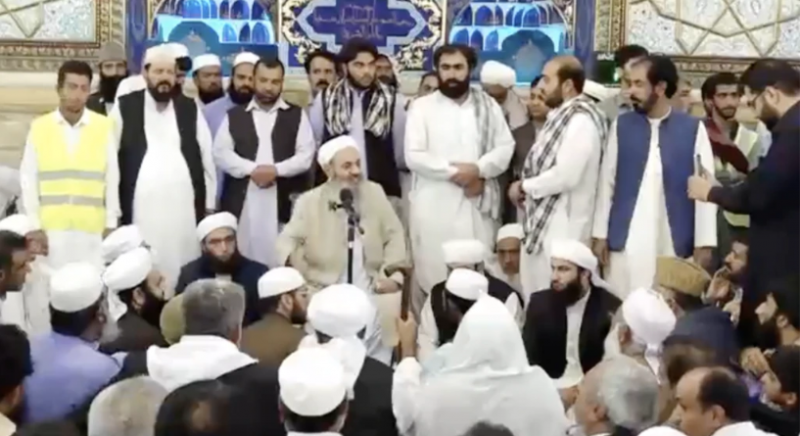
Tehran: A prominent Sunni cleric in Iran has called for a speedy vote with outside observers to "change policies based on the wishes of the people".
On 4 November, Molawi Abdulhamid Ismailzah urged the Qom seminary and the government of Iran to heed the voices of those who have been protesting for the past 50 days in his Friday prayer sermon in the city of Zahedan in the country's southeast.
The cleric, who is nicknamed Molawi Abdolhamid across the country, has previously urged the government to heed the demands of the protesters The Iranian government has not responded to his call for a referendum.
Also Read: Demonstrations erupt after Imran Khan was injured in a 'planned attempted assassination.'
The cleric is the head of Iran's primary Sunni seminary and is considered a spiritual figure for the country's Sunni Muslim community. He is a staunch opponent of the Iranian regime and has come under criticism for his remarks about the Islamic republic.
He claimed that senior officials, including Supreme Leader Ayatollah Ali Khamenei, were "responsible" for the killings that took place during his sermon in Zahedan on September 30 during Friday prayers earlier this month.
Following the September 30 massacre in Zhedan, street protests took place for the fifth consecutive week at the same time in various cities in Sistan and Balochistan province. In a video posted on social media on November 4, security personnel opened fire on protesters in the nearby town of Khash.
Disputes and firing on protesters have also been reported in other cities of Sistan and Balochistan province, including Sarwan, Zahedan and Iranshahr.
Social media posts and accounts of violence at protests across Iran could not be independently verified. On 3 November, events were held in Tehran, Tabriz, Shiraz, Rasht and several other cities in the western Iranian province of Kurdistan.
Also Read: Christian monastery may be pre-dating Islam found in USA
Videos posted on social media show hundreds of mourners gathered at the grave of 19-year-old aspiring chef Mahshad Shahidinejad, who was allegedly killed after he was arrested during a protest in the Iranian city of Arak in the center of the country.
According to reports, state security forces used tear gas on mourners gathered at the grave of Mahsa Mougoi, an 18-year-old woman who died on September 22 during nationwide demonstrations against the death of Mahsa Amini in police custody. The incident happened on November 3 in Isfahan city.
At least one woman was shot in Isfahan, according to a video posted on Twitter on November 3. The woman is suspected to have been shot in the head, with blood on her face.
Security personnel prevent a memorial service for the late RFE/RL journalist Reza Hagighatnejad in the southern Iranian city of Shiraz. Those present at the ceremony objected to the action of security agents by chanting phrases in memory of Hagighatnejad and against the government.
After confiscating Hagighatnejad's body upon repatriation to Iran, Iranian authorities secretly buried him at a location near Shiraz on 30 October, angering his family.
Domestic and international reactions to Iran's continued repression of protesters continue. Olympic gold medalist and Iranian wrestler Rasool Khadam criticized President Ibrahim Raisi on Instagram for downplaying the protests.
Additionally, in a statement describing the security forces attack on students as "barbaric", more than 100 professors from Tehran University expressed their opposition to the attack on the university on 29 October. According to the statement, the ongoing security strategy and operations such as the "horrific attack" on the university by security personnel in plainclothes is devastating.
Also Read: Pope’s Visit to Bahrain: Calls to Address Human Rights Issues are Growing
According to the signatories, the students who are being held should be released immediately. Iran Human Rights, an organization based in Oslo, claims that drastic action in response to anti-government protests has resulted in at least 277 deaths, including 40 children.
The Iranian government has not admitted guilt for the protesters' deaths and has, in most cases, blamed them on factors such as accidents, illness and suicide.